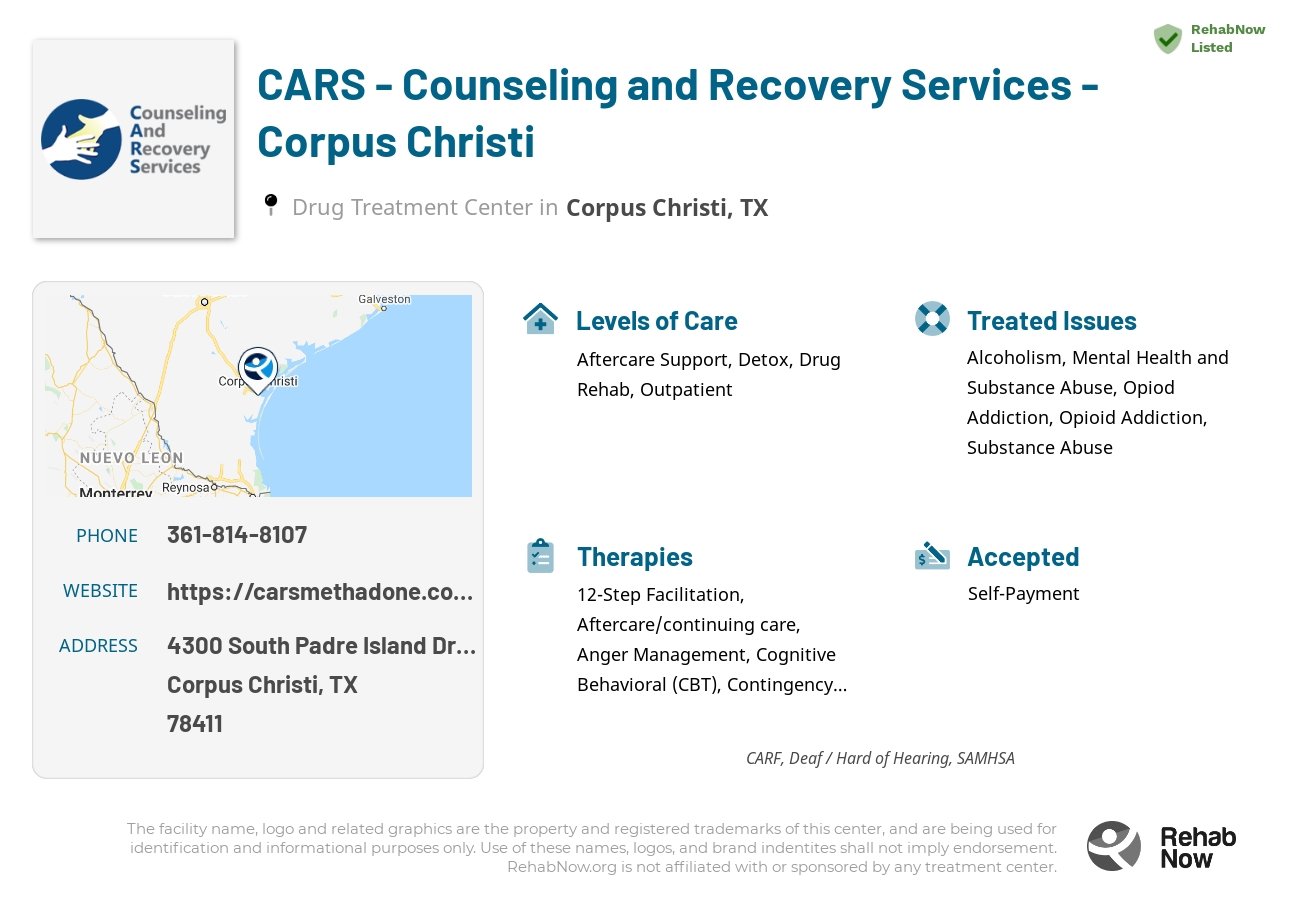Counseling and Recovery Services - CARS
Drug Rehab Center in Corpus Christi, Texas
Counseling and Recovery Services (CARS) offers comprehensive addiction treatment in Corpus Christi, TX through a range of therapeutic methods and treatments, including detox, rehab, and aftercare, for various substance abuse and addiction-related issues, and is accredited by CARF and affiliated with mental health organizations such as SAMHSA.
About
Counseling and Recovery Services - CARS is an accredited Alcoholism, Dual Diagnosis, Opioid Addiction, and Drug Addiction Treatment Facility located in Corpus Christi, TX. They are certified by the Commission on Accreditation of Rehabilitation Facilities (CARF) and the Substance Abuse and Mental Health Services Administration (SAMHSA). CARS offers a range of treatment options for individuals suffering from alcoholism, dual diagnosis, opioid addiction, and drug addiction. They provide outpatient services, aftercare support, and detox levels of care.
At Counseling and Recovery Services - CARS, individuals struggling with addiction and substance abuse can benefit from a variety of comprehensive services. These include outpatient treatment programs that allow patients to receive therapy and support while maintaining their daily routines. They also offer aftercare support to help individuals successfully transition back into their communities after completing treatment. Additionally, CARS provides detox services, helping patients safely and comfortably withdraw from drugs or alcohol under medical supervision. These services cater to those dealing with alcoholism, dual diagnosis, opioid addiction, and drug addiction, providing the necessary resources and support for recovery.
Genders
Ages
Modality
Additional
Accreditations
SAMHSA

CARF
The Commission on Accreditation of Rehabilitation Facilities (CARF) is a non-profit organization that specifically accredits rehab organizations. Founded in 1966, CARF's, mission is to help service providers like rehab facilities maintain high standards of care.
Conditions and Issues Treated
Within the past decade, opioid addiction has become a nationwide epidemic. The United States hosts one of the world’s highest rates of opioid use or abuse and has one of the highest rates of opioid-related deaths. In the United States, opioid drugs are classified as Schedule II-IV controlled substances due to their highly addictive properties and potential for abuse. These include morphine, opium, heroin, oxycodone, hydrocodone, methadone, and fentanyl. Physicians usually prescribe opioids to help control pain.
Over time, opioid users develop a tolerance for the drugs, which makes it difficult, if not impossible, to function without them. In turn, opioid users often resort to illicit means of obtaining the drugs. These means can include drug dealers, friends, and family members who do not have legitimate prescriptions for the drugs. Opioid addiction can quickly lead to heroin use, especially those seeking more intense highs than prescription opioids offer. Due to the high risk of overdose, heroin users are at a much higher risk for illness and death.
Levels of Care Offered
This center offers a variety of custom treatment tailored to individual recovery. Currently available are Aftercare Support, Detox, Outpatient, with additional therapies available as listed below.
Detoxification is a critical first step in treatment for drug addiction. Drug detoxification helps the individual withdraw from the drug by providing a controlled environment where symptoms can be managed through medication and close observation. Detoxification is an inflection point where the individual can get on a recovery track, but it’s also one of the most dangerous points in the recovery process.
In addition to going through physical withdrawal from certain drugs, a detox program also provides the individual with drug testing to monitor their progress. This way, if the individual is not ready for sobriety (such as if they relapse), the treatment professionals can catch it early on and use that opportunity to help re-orient the individual towards recovery.
An outpatient treatment program is set up to help with alcohol or drug addiction or a co-occurring disorder. The treatment must attend the treatment facility for their therapy and other programs but return home each night. The frequency of mandatory attendance decreases after much of the treatment program is complete. The treatment programs are monitored by the treatment facility and case managers who work for a judge or judge’s office. A treatment program may be performed out of a treatment facility, treatment clinic, or treatment center.
The benefits of outpatient treatment programs are many. One of the most beneficial treatment programs is that it allows treatment for clients who cannot afford or may not be able to attend treatment at a treatment facility, treatment center, or treatment clinic full-time. Another benefit of treatment programs is that they reduce crime rates because treatment allows people to treat their addiction.
Recovering drug addicts need aftercare support when they leave treatment. The support can include guidance through 12-step programs, outpatient rehabilitation programs, and support groups. Aftercare supports the individual in their desire to maintain sobriety by reducing relapse risk with positive choices.
The success of drug treatment does not end when the addict leaves the rehabilitation center. There is no such thing as a “one and done” type of rehabilitation process. Recovery is a lifelong journey that begins with treatment and continues by the addict committing to outside support groups or drug rehab programs.
When choosing a program, it is crucial to choose one that will provide long-term aftercare support. This ensures that you have the tools you need to sustain your recovery.
Therapies & Programs
Group therapy sessions provide recovering addicts with a chance to cope with everyday situations that many face. Group therapy sessions are held in rehab facilities, clinics, churches or community centers that offer drug addiction treatment.
People who attend these groups are encouraged to voice their feelings and support other addicts in recovery. This helps group members strengthen their own recovery program while cheering on others who are struggling with sobriety.
Trauma therapy allows them to work through past trauma to have peace of mind and begin down the road of sobriety. The therapist will work with the individual to help them understand their past and present relationships. Patients may often believe that something is inherently wrong with them or they are unworthy of love. The therapist aims to correct these negative feelings and behaviors by helping the person realize that their actions do not reflect who they truly are.
Dialectical behavior therapy, or DBT, is one form of cognitive behavioral treatment. This type of therapy typically involves both individual and group sessions with a therapist on a regular basis.
It uses concepts like mindfulness training to help addicts learn how to identify their thoughts, feelings, behaviors and the experiences that trigger them so they can avoid relapse. DBT also teaches addicts how to regulate their emotions, which can make it easier for them to avoid or overcome negative thoughts and cravings.
Cognitive Behavioral Therapy (CBT) is a highly effective treatment option based on the idea that how we feel, think and act all interact together. Our thoughts determine our feelings and behaviors; our feelings affect our thoughts, and our behaviors change our thoughts and feelings. CBT helps people explore their thoughts for problems (or false beliefs) that influence their mood and actions. By examining their thoughts and beliefs, people can recognize distorted or irrational and modify them to more realistic, positive ones. CBT is very goal-oriented, which means that the therapist and patient work together on a specific problem while learning to become more adept at solving future problems.
CBT works well with a broad range of people, including those with depression, anxiety disorders, eating disorders, and problems with anger. In addition to helping a client focus on thoughts that can be changed, CBT also allows them to take an active role in their treatment. This is called a collaborative approach because both patient and therapist work together to produce the best possible results.
CBT is based on cognitive learning theory, which says that our behavior is a learned response to our environment. Cognitive refers to thoughts and beliefs, while behavioral relates to actions or deeds. CBT helps people learn ways of behaving to improve their quality of life by focusing on specific problems or goals they want to achieve. Sometimes, CBT is used alone; other times, it is combined with medications or brief counseling techniques such as solution-focused and motivational interviewing to achieve optimal results for the patient.
Rational Emotional Behavior Therapy (REBT) was developed by Dr. Albert Ellis in 1955. The therapy is based on the premise that our beliefs lead to and maintain our emotions and behaviors. It does not incorporate the use of medications or supplements. Instead, REBT focuses on helping people understand, respect, and accept their feelings without judgment.
Payment Options Accepted
For specific insurance or payment methods please contact us.
Counseling and Recovery Services Associated Centers
Discover treatment facilities under the same provider.
- CARS - Tomball in Tomball, TX
- CARS - Counseling and Recovery Services - Tomball in Tomball, TX
- CARS - Counseling and Recovery Services - Corpus Christi in Corpus Christi, TX
Learn More About Counseling and Recovery Services Centers
Additional Details
Specifics, location, and helpful extra information.
Corpus Christi, Texas 78411 Phone Number(361) 814-8107 Meta DetailsUpdated November 25, 2023
Staff Verified
What else do people call Counseling and Recovery Services – CARS?
People have occasionally also searched for “Counseling and Recovery Services - CARS in Texas”
Patient Reviews
There are no reviews yet. Be the first one to write one.
Corpus Christi, Texas Addiction Information
Texas is one of the primary hubs for drug smuggling into the country. The border between Texas and Mexico is more than 1,000 miles long. More than 10 million residents use alcohol every year and more than 25% of those are minors. Alcohol and drug use has become so common in Texas that almost 15% of all deaths can be attributed to these substances.
An estimated 34% of all households in Corpus Christi, Texas, are affected by substance addiction each day. In Nueces County, the rate of drug abuse infractions has increased by 2.96 percent in recent years. In Nueces County, the rate of drug abuse infractions has increased by 2.96 percent in recent years. Inpatient rehab, outpatient rehab, and therapy are the most common types of treatment for addicts in Corpus Christi, Texas.
Treatment in Nearby Cities
- Weatherford, TX (349.4 mi.)
- Rosenberg, TX (159.4 mi.)
- Alpine, TX (420.6 mi.)
- Mansfield, TX (335.4 mi.)
- Marble Falls, TX (204.8 mi.)
Centers near Counseling and Recovery Services - CARS
The facility name, logo and brand are the property and registered trademarks of Counseling and Recovery Services - CARS, and are being used for identification and informational purposes only. Use of these names, logos and brands shall not imply endorsement. RehabNow.org is not affiliated with or sponsored by Counseling and Recovery Services - CARS.






